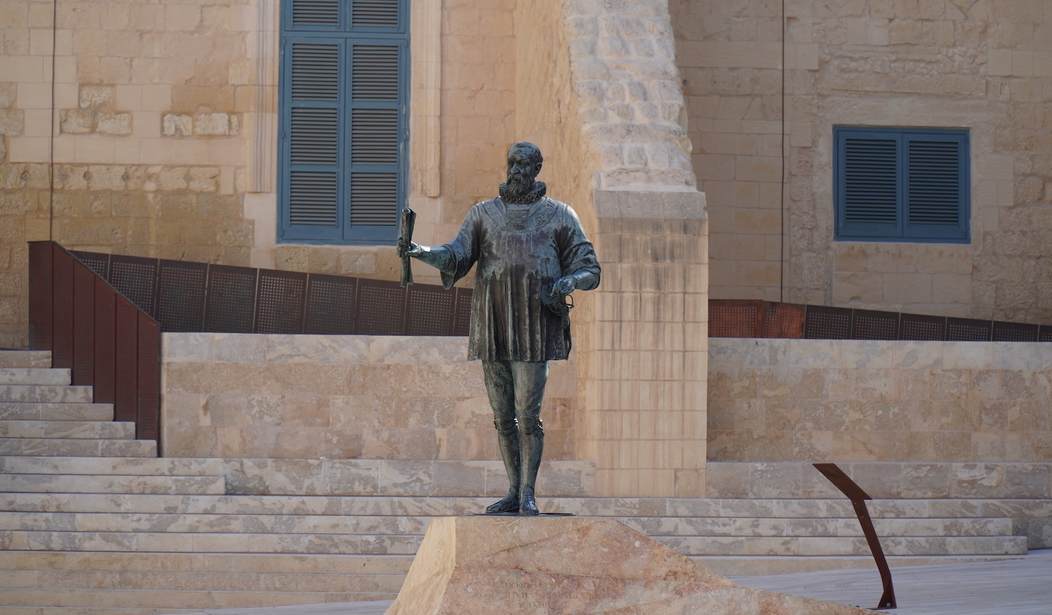Although 9/11 will forever be associated with the jihadist massacre of some 3,000 Americans, for centuries earlier, September 11 was celebrated as the day when a small band of Christian knights defeated a massive Muslim horde. That story is worth recounting.
After the Ottoman Empire declared jihad on Malta in the spring of 1565, 30,000 Turks, armed to the teeth and with all sorts of heavy artillery, descended on the tiny Mediterranean island, which was defended by a few thousand shabbily armed Maltese men, under the leadership of the Knights of Saint John.
Enter Jean Parisot de Valette (1494–1568), the Grand Master of the Knights. “His disposition is rather sad,” wrote a contemporary, but “for his age [seventy-one], he is very robust” and “very devout.” As the Muslim sails approached, de Valette explained to his men what was at stake: “A formidable army composed of audacious barbarians is descending on this island,” he warned; “these persons, my brothers, are the enemies of Jesus Christ. Today it is a question of the defense of our Faith as to whether the book of the Evangelist [the Gospel] is to be superseded by that of the Koran. God on this occasion demands of us our lives, already vowed to His service. Happy will those be who first consummate this sacrifice.”
Once the Turks arrived, they subjected the tiny Mediterranean island to what was then the heaviest nonstop bombardment any locale had been subjected to in history. “With the roar of the artillery and the arquebuses, the hair-raising screams, the smoke and fire and flame,” a chronicler wrote, “it seemed that the whole world was at the point of exploding.”
The vastly outnumbered and soon wearied defenders, who were ordered to “fight bravely and sell their lives to the barbarians as dearly as possible,” did just that; and for every Christian killed defending the fort, numerous Muslim besiegers fell.
After reducing to rubble and storming the fort of St. Elmo, the Turks sadistically slaughtered all 1,500 of its defenders: the Knights of Saint John “were hung upside down from iron rings . . . and had their heads split, their chests open, and their hearts torn out.” The Muslim commander, Mustafa, ordered their mutilated corpses (along with one Maltese priest) nailed to wooden crosses and set adrift to deride and demoralize the other onlooking defenders.
The terror tactic failed. The 71-year-old Valette delivered a thundering and defiant speech before the huddled Christians, beheaded all Muslim prisoners, and fired their heads from cannon at the Turkish besiegers.
The Ottomans continued to subject the rest of the island to a sustained bombardment (some 130,000 cannonballs were fired in total). “I don’t know if the image of hell can describe the appalling battle,” wrote a contemporary: “the fire, the heat, the continuous flames from the flamethrowers and fire hoops; the thick smoke, the stench, the disemboweled and mutilated corpses, the clash of arms, the groans, shouts, and cries, the roar of the guns . . . men wounding, killing, scrabbling, throwing one another back, falling and firing.”
Related: When Men Were Men: Today in History, Europeans Pulverize Jihadists
Although the rest of the forts were reduced to rubble, much Muslim blood was spilled for each inch gained; for “when they got within arms’ reach the scimitar was no match for the long two-handed sword of the Christians.” Desperate fighting spilled into the streets, where even Maltese women and children participated.
It was now late August and the island was still not taken. That, and mass Muslim casualties, led to mass demoralization in the Ottoman camp. Embarrassed talk of lifting the siege had already begun when a Sicilian relief force finally arrived with nearly 10,000 soldiers at St. Paul’s Bay. There, where the apostle was once shipwrecked, the final scene of this Armageddon played out as the fresh newcomers routed the retreating Ottomans.
The Muslims finally fled, and Malta was liberated, on September 11, a day which for years thereafter was celebrated.
Note: All quotations in the above account were excerpted from and documented in Raymond Ibrahim’s book, Sword and Scimitar: Fourteen Centuries of War between Islam and the West.










Join the conversation as a VIP Member